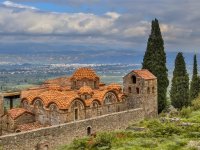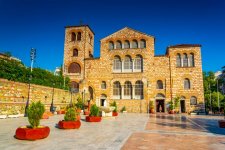Menu
Install the app
How to install the app on iOS
Follow along with the video below to see how to install our site as a web app on your home screen.
Note: This feature may not be available in some browsers.
You are using an out of date browser. It may not display this or other websites correctly.
You should upgrade or use an alternative browser.
You should upgrade or use an alternative browser.
Greek History Community
I love Byzantine architecture and history!
- Thread starter nadellii
- Start date
1 - 3 of 3 Posts
k_tsoukalas
Administrator
I totally agree, as well, and we have adopted this style for some of our Greek churches in the United States. It's neat to see the influences!
1 - 3 of 3 Posts
JOIN THE DISCUSSION AND READ OTHER GREEK INFO:
Question about Greece during WWI
- ssherie_
- Greek History Forum
- Replies: 0
I am trying to learn more about Greek history. This is a family project! What I am learning about now is Greece's involvement in WWI. From what I've gathered, Greece had a rather complex and interesting stance during World War I, but I'm looking for more in-depth information.
Could anyone here provide insights or point me towards resources that detail:
Could anyone here provide insights or point me towards resources that detail:
- Greece's political climate leading up to its involvement in WWI.
- The significance of the National Schism and how it affected Greece's participation.
- Key battles or military campaigns that Greek forces were involved in.
What did the Ancient Greeks eat?
- mj_toronto8
- Greek History Forum
- Replies: 1
I am fascinated by the Ancient Greeks. I have a feeling that some of our modern Greek recipes are similar to the ancient ones. Like spoon sweets. It think that seems like something that was developed a long time ago as a way to preserve the fruit harvest.
So, I have been researching this. What did the Ancient Greeks eat? I wanted to share this video because I thought it was interesting.
So, I have been researching this. What did the Ancient Greeks eat? I wanted to share this video because I thought it was interesting.
History of the tradition of decorating boats for Christmas
- voula_slat
- Greek History Forum
- Replies: 1
One of the most interesting Greek Christmas traditions to me is the one where people decorate boats. So, I started to research the history. Here's a bit of what I discovered:
The roots of the tradition of decorating boats in Greece for Christmas can be traced back to the country's longstanding ties with the sea. In Ancient Greece, people would often looked to the sea for both sustenance and inspiration, and it was not uncommon for ships to be adorned with religious symbols and decorations.
It also has ties to early Christianity in Greece. According to Greek Orthodox beliefs, Saint Nicolas (aka Santa Claus) was a sailor, and he is the patron saint of sailors. Decorating boats is often seen as a way to honor him.
Over time, this practice became associated with the Christmas season, and the boats began to be decorated specifically for the holiday.
People also make paper boats to decorate. Some call these the "yule boat" or karavaki. One of the most famous examples of this practice is the Yule boat, or karavaki.
The earliest known evidence of decorating boats for Christmas in Greece dates back to the 19th century. During this time, sailors would deck out their boats with lights and tiny boats. These tiny boats were often placed inside the larger boat, symbolizing protection from harm while at sea.
Does anyone have anything to add?
The roots of the tradition of decorating boats in Greece for Christmas can be traced back to the country's longstanding ties with the sea. In Ancient Greece, people would often looked to the sea for both sustenance and inspiration, and it was not uncommon for ships to be adorned with religious symbols and decorations.
It also has ties to early Christianity in Greece. According to Greek Orthodox beliefs, Saint Nicolas (aka Santa Claus) was a sailor, and he is the patron saint of sailors. Decorating boats is often seen as a way to honor him.
Over time, this practice became associated with the Christmas season, and the boats began to be decorated specifically for the holiday.
People also make paper boats to decorate. Some call these the "yule boat" or karavaki. One of the most famous examples of this practice is the Yule boat, or karavaki.
The earliest known evidence of decorating boats for Christmas in Greece dates back to the 19th century. During this time, sailors would deck out their boats with lights and tiny boats. These tiny boats were often placed inside the larger boat, symbolizing protection from harm while at sea.
Does anyone have anything to add?
Learning about the Olympic Games
- paharo45
- Greek History Forum
- Replies: 1
It's an Olympics year so I thought I would chat a bit about the Olympic Games!
The original Olympic Games, held in Olympia, Greece, were primarily a festival celebrating Zeus, the king of the Greek gods. These games began around 776 BC and featured a range of athletic competitions, from foot races to combat sports like wrestling and boxing. Interestingly, the games were so significant that wars were put on hold, and conflicts paused to allow athletes and spectators to travel safely to Olympia. This ancient tradition of the Olympic Truce or "Ekecheiria" is a testament to the power of sport in fostering peace and unity, a principle that remains at the heart of the Olympics today.
I find it absolutely intriguing how these ancient games laid the groundwork for the modern Olympics, introducing concepts of sportsmanship, excellence, and the idea of bringing people together through the universal language of sport.
Has anyone visited ancient Olympia? Do you guys enjoy watching the Olympic Games?
The original Olympic Games, held in Olympia, Greece, were primarily a festival celebrating Zeus, the king of the Greek gods. These games began around 776 BC and featured a range of athletic competitions, from foot races to combat sports like wrestling and boxing. Interestingly, the games were so significant that wars were put on hold, and conflicts paused to allow athletes and spectators to travel safely to Olympia. This ancient tradition of the Olympic Truce or "Ekecheiria" is a testament to the power of sport in fostering peace and unity, a principle that remains at the heart of the Olympics today.
I find it absolutely intriguing how these ancient games laid the groundwork for the modern Olympics, introducing concepts of sportsmanship, excellence, and the idea of bringing people together through the universal language of sport.
Has anyone visited ancient Olympia? Do you guys enjoy watching the Olympic Games?
Greek Independence Day History
- redsoxdw_
- Greek History Forum
- Replies: 1
Greek Independence Day is coming up! I thought I would share a bit that I know about the history. Please chime in with corrections or anything to add!
- The Spark of Revolution: Greek Independence Day marks the day in 1821 when the Greeks began their revolt against the Ottoman Empire, a state that had controlled Greece for nearly 400 years. This revolt was influenced by the surge of nationalism throughout Europe and inspired by the Enlightenment ideals of liberty, equality, and fraternity.
- A Poet’s Declaration: The revolution officially began after Bishop Germanos of Patras raised the Greek flag at the Monastery of Agia Lavra in Peloponnese, symbolizing the call to arms. However, it was rumored that the war of independence was actually declared a few days earlier by Alexandros Ypsilantis, a Greek national hero, in the Danubian Principalities.
- International Support: The Greek fight for independence was not just a local effort; it garnered substantial international support from prominent figures such as Lord Byron from Britain, who notably spent his own money and later died in Greece, contributing to the Greek cause. This international backing was crucial for the morale of the Greek fighters and helped in diplomatic efforts later on.
- The Battle of Navarino: A pivotal point in the Greek War of Independence was the Battle of Navarino in 1827, where the combined fleets of Britain, France, and Russia defeated the Ottoman and Egyptian fleets. This naval battle marked a significant turning point that led to the eventual independence of Greece.
- Recognition and Autonomy: Greek Independence was formally recognized in 1830 by the Treaty of London. However, full sovereignty and the delineation of the Greek borders were not achieved until later. It allowed the foundation of the modern Greek state, under the governance of King Otto from Bavaria.
Share and discuss Greek history!
WorldwideGreeks.com is a free online forum community where people can discuss Greek food, travel, traditions, history and mythology.
Join Worldwide Greeks here!
Join Worldwide Greeks here!
JOIN COMMUNITY FOR FREE
LOGIN TO YOUR ACCOUNT




